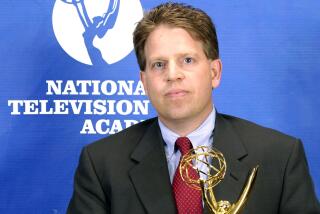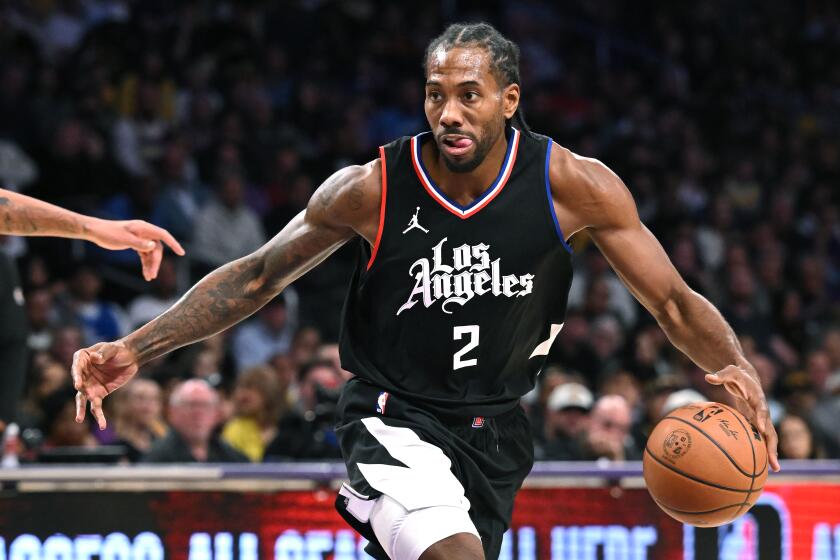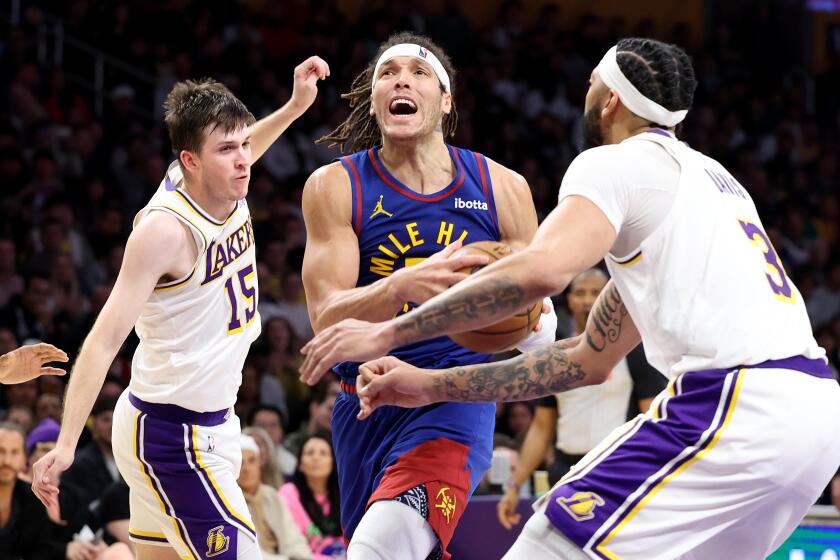Jackie Robinson’s life continues to inspire ESPN’s Doug Glanville
Imagine what Jackie Robinson could have accomplished in his messaging with modern-day media platforms.
“It would have been amazing,” Doug Glanville says. “He was a prolific letter writer to start with — but he really was viral before there was viral, even with just the traditional media outlets covering him.”
The 48-year-old former MLB outfielder in his latest role at ESPN considers himself to be a media multitasker, thanks to his “crash course in every way one can express ideas.” He’s also thankful to be back as part of the network’s litany of Jackie Robinson Day remembrances on Monday — including L.A. receiving the national coverage of the Dodgers-Reds contest at Dodger Stadium that will include Rachel Robinson and two of her children.
After a nine-year run as a heady outfielder with the Chicago Cubs, Philadelphia Phillies and Texas Rangers, Glanville put in seven seasons at ESPN on game and studio analysis work. But then he was blindsided by network layoffs in 2017.
He had a side gig writing about sports and social justice for the New York Times and had an acclaimed 2010 book published, “The Game From Where I Stand.” From where he stood at that moment, Glanville needed introspection and reinvention.
“I was grateful ESPN gave me this powerful ability to learn so many platforms — interviews to post-production to digital to radio,” said Glanville, who worked an Angels-Cubs game from Wrigley Field for NBC Sports Chicago on Friday before flying home.
“I needed all that as I was going to go back to my roots, think of what’s next, what were my passion points. An academic side came up and served a purpose.”
Glanville left ESPN with class, then a class to teach at his alma mater Penn. A lecture course called “Communications, Sports and Social Justice” focused on how sports messages were crafted to effect change on society. ESPN baseball analyst Jessica Mendoza was among the guest speakers.
“To hear him teach the class, then be part of it, the things he asked me to bring up, how the students reacted … that tells so much about Doug’s political awareness and what sports means in this space today,” said Mendoza. “He is so smart and so socially, culturally, racially and gender aware of everything happening in our country right now. I’m so happy he’s back at ESPN.”
A year later, Glanville spun that into a seminar for 20 students once a week at Yale called “Athletes, Activism, Public Policy and the Media,” for the political science department.
“Jackie Robinson’s effort was always to find a way into something new,” said Glanville, “and I’m blown away in finding new ways to engage this next generation. They listen and debate and understand how sports is woven into so many disciplines in our lives – economics, sociology, anthropology. And baseball is the most beautiful storytelling sport of all. Jackie Robinson showed how it can be a pivot point of harmony.”
Somehow, it rotates back to Robinson.
A personal story Glanville uses as a test case with students is an incident he had at Los Angeles International Airport in September 2015. A taxi driver belligerently refused to give him a ride as he waited on the curb with a white colleague from ESPN. Glanville was yelled at to take the bus instead.
While he got into another cab, Glanville was encouraged by an LAX officer who witnessed it to report the incident because of its repetitive nature. Glanville not only did that but he engaged more decision-makers, which led to the L.A. City Council calling an emergency meeting to discuss it after his account appeared in The Atlantic. It led to an LAPD undercover sting operation and more confirmation.
Glanville believes he channeled Robinson in handling that situation.
“When I think of Jackie Robinson, I’m struck by his patience and focus, and I think I took a lot of pages out of that — I took a deep breath, understood that society has made a lot of strides since Robinson’s days but there is still a lot of work to do,” said Glanville.
“There was a collective process — not to get the driver fired, but an example of bringing people together into a common cause to improve upon this. It hit home for a lot of people. There is now zero tolerance policies in place and quarterly checks to see if people are holding to standards.”
Glanville’s return to ESPN isn’t coincidental.
“We welcome back Doug Glanville,” said Norby Williamson, ESPN executive vice president and executive editor, studio production. “He will be a versatile asset to our team of baseball analysts for the 2019 season as we re-imagine our content.”
This annual Robinson reboot provides a perfect example of Glanville’s added value.
Glanville, who gave his son the middle name of Robinson, came from parents who wrote poetry and were educators in North Carolina, in a city that during the 1960s was voluntarily desegregated.
“That absolutely gave me the groundwork for my strong connection to the Jackie Robinson story,” said Glanville. “Knowing my family was committed to things in the spirit of what he represented, and then loving baseball on top of it all, I am very fortunate.
“I’m always inspired by his story and learn more every day about what he fought for.”
A Masters like no other
The back-to-back video replays of Tiger Woods hugging his father, Earl, after his first Masters win in 1997 and then hugging his son, Charlie, in the same spot on the Augusta National course after winning Sunday’s Masters provided an emotional, masterful punctuation for CBS’ coverage of the weekend.
CBS’ ability as well to shift coverage to the early start at 6 a.m. Sunday — and then replay the entire five-hour window starting at noon — was a fortunate residue of an historic event. This was also CBS’ first golf coverage after a two-month layoff to cover college basketball’s conclusion, and its first since the PGA Tour’s Genesis Open at Riviera in mid-February, but the network was back on its game.
Perhaps, until the finish.
Viewers might have smelled an azalea-scented blanket of CBS’ analysts trying to out-gush each other, overworking the cliché meter. Those may have been honest reactions from Ian Baker Finch calling a “Cinderella story” or Peter Kostis dropping “the impossible has become possible” during Woods’ final holes, but there could have been more self-policing to stick to reporting and let the video and graphics tell what was still far from a certainty. Verne Lundquist’s retro call of Woods’ near hole-in-one at the 16th hole with “Oh my goodness” could be excused.
But all the premature exasperation needed to recalibrate as Jim Nantz waited until Woods stood over a putt at the 18th green and “put it in context: This is going to be … the completion of one of the great comebacks in any sport all time.” And as Woods tapped in to win, Nantz finished: “This is the minute millions around the world have waited for … many doubted we’d ever see it, but here it is … the return to glory.”
Now if there was only a way to get Tony Romo into the 18th tower ….
More to Read
Get our high school sports newsletter
Prep Rally is devoted to the SoCal high school sports experience, bringing you scores, stories and a behind-the-scenes look at what makes prep sports so popular.
You may occasionally receive promotional content from the Los Angeles Times.






